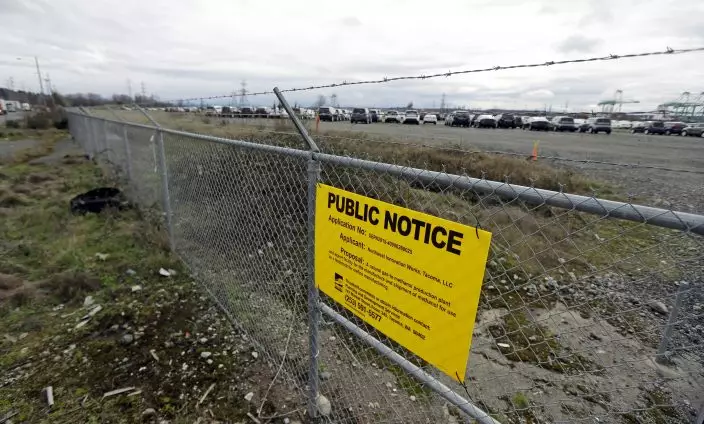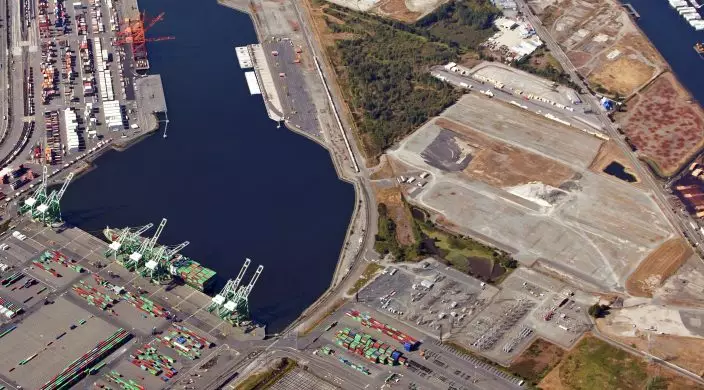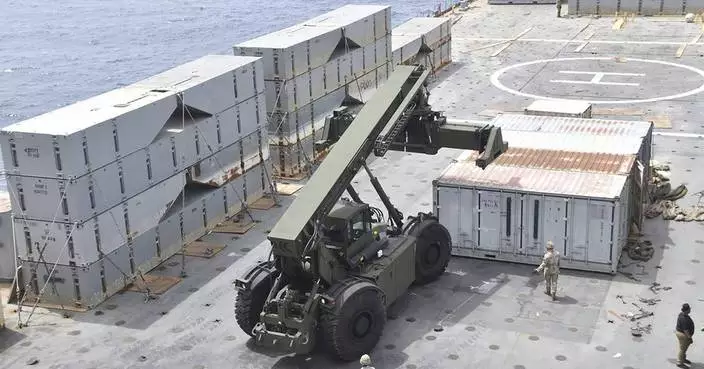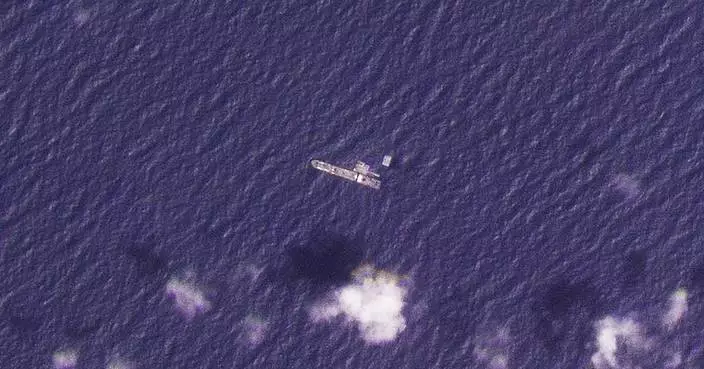A federal lawsuit filed Tuesday aims to keep one of the world's biggest methanol refineries from being built along the Columbia River in Washington state.
Plans for the $2 billion refinery, shipping terminal and pipeline project in the small city of Kalama are already stalled after a state board required further environmental review.
Conservation and public health groups, including Columbia Riverkeeper, the Sierra Club and Washington Physicians for Social Responsibility, sued in U.S. District Court in Tacoma to invalidate key federal permits as well.

FILE - This Feb. 18, 2016, file photo shows a public notice sign marking the site of a proposed methanol plant at the Port of Tacoma in Tacoma, Wash. A new federal lawsuit filed Tuesday, Nov. 12, 2019, aims to kill plans to build one of the world's biggest methanol refineries along the Columbia River. (AP PhotoTed S. Warren, File)
The U.S. Army Corps of Engineers, which issued the permits, did not immediately respond to an email seeking comment.
"The urgency of our climate crisis demands the highest level of scrutiny, and we cannot allow massive new fracked gas projects to move forward based on outdated science and flawed evaluation," Joan Crooks, chief executive of Washington Environmental Council, said in a news release announcing the lawsuit.
The refinery is billed as a facility that would turn fracked natural gas from Canada into methanol for shipment to China to make plastics. But a report by Oregon Public Broadcasting earlier this year revealed that the company behind the project had suggested to investors the methanol could be burned as fuel. That would make for a worse impact on the planet, environmental groups say.

FILE - This Sept. 5, 2012, aerial photo provided by the Port of Tacoma shows the site of a proposed methanol plant at the Port of Tacoma, seen at right in Tacoma, Wash. A new federal lawsuit filed Tuesday, Nov. 12, 2019, aims to kill plans to build one of the world's biggest methanol refineries along the Columbia River. (Port of Tacoma via AP, File)
The project is backed by Northwest Innovation Works, a U.S. company owned by the Chinese government. The company did not immediately return an email seeking comment Tuesday, but it has argued that its facility would provide a cleaner source of methanol for plastics than coal.
A study conducted for the company suggested that if the plant is not built, methanol derived from coal would continue to supply the growing Chinese market, resulting in worse greenhouse gas emissions.
"If your goal is to dramatically reduce global greenhouse gas emissions, you want this facility to be built," Kent Caputo, general counsel for Northwest Innovation Works, said in a news release in August.
Kristen Boyles, an attorney for the plaintiffs with the environmental law firm Earthjustice, called that ludicrous.
"If there was evidence that building this project would cause other plants to shut down, then maybe that would be worth considering," she said Tuesday. "It's unsupported and entirely speculative."
The groups said the U.S. Army Corps of Engineers did not properly consider the huge amount of greenhouse gases the project would emit — more than 1 million tons per year, an amount that would increase Washington's greenhouse gas emissions by 1 percent.
Instead, they said, the agency conducted a more cursory review and issued a finding that issuing permits would have "no significant impact" on the environment.
They also said federal reviews had failed to properly consider the project's effects on threatened salmon runs and on endangered orcas.
Local officials have supported the project, noting it would bring about 1,000 construction jobs and 190 longer-term positions to the region.
Washington Gov. Jay Inslee used to support it, saying it would help clean up China's plastics industry. He changed his mind last May amid his short-lived presidential run, which centered on combatting climate change. He said that because of the urgency of the threat from global warming, he could no longer support launching massive new fossil-fuel infrastructure in the state.
WASHINGTON (AP) — The United States on Wednesday imposed new sanctions on hundreds of companies and people tied to Russia's weapons development program, more than a dozen Chinese entities accused of helping Moscow find workarounds to earlier penalties, and individuals linked to the death of Kremlin opposition leader Alexei Navalny.
The actions by the departments of Treasury and State target Russia’s military-industrial base, chemical weapons programs and people and companies in third countries that help Russia acquire weapons components as its invasion of Ukraine has entered its third year.
Treasury Secretary Janet Yellen said the action “will further disrupt and degrade Russia’s war efforts by going after its military industrial base and the evasion networks that help supply it.”
The Senate, meanwhile, gave final approval to legislation barring imports of Russian uranium, boosting U.S. efforts to disrupt Russia’s war in Ukraine. Democratic President Joe Biden is expected to sign the bill into law.
About 12% of the uranium used to produce electricity at U.S. nuclear power plants is imported from Russia, according to the U.S. Energy Information Administration.
A spokesperson for the National Security Council said Wednesday that Biden shares lawmakers’ concerns about U.S. reliance on Russia for low-enriched uranium to support its domestic nuclear fleet.
Included in the administration's announcement are importers of cotton cellulose and nitrocellulose, which are used to produce gunpowder, rocket propellants and other explosives. The penalties also target Russian government entities and people tied to Russia's chemical and biological weapons programs, companies related to Russia's natural gas construction projects and three workers at the penal colony where Navalny died.
Russian President Vladimir Putin has railed against earlier rounds of U.S. and Western penalties, claiming they are “illegitimate sanctions” on his country.
A group of 16 targets in China and Hong Kong, most of which are related to Russian procurement workarounds, are named by the Biden administration.
Yellen traveled to Guangzhou and Beijing last month to warn Chinese officials that they “must not provide material support for Russia’s war and that they will face significant consequences if they do."
China has said it is not providing Russia with arms or military assistance, although Beijing has maintained robust economic connections with Moscow, alongside India and other countries, as the West imposes sanctions.
Companies in China, Azerbaijan, Belgium, Slovakia, Turkey and the United Arab Emirates were accused of helping Russia acquire technology and equipment from abroad. The penalties aim to block them from using the U.S. financial system and bar American citizens from dealing with them.
Biden last week said he would immediately rush badly needed weaponry to Ukraine as he signed into law a $95 billion war aid measure that also included assistance for Israel, Taiwan and other global hot spots.
The upcoming uranium ban is also expected to impact Russian revenues by at least $1 billion. The U.S. banned Russian oil imports after Russia invaded Ukraine in early 2022 but did not against uranium, despite frequent calls to do so by U.S. lawmakers in both parties.
Wyoming Sen. John Barrasso, the top Republican on the Senate Energy and Natural Resources Committee, called the import ban “a tremendous victory” and said it “will help defund Russia’s war machine, revive American uranium production and jumpstart investments in America’s nuclear fuel supply chain.″
“Wyoming has the uranium to replace Russian imports, and we’re ready to use it,″ Barrasso added.
West Virginia Sen. Joe Manchin, a Democrat who heads that Senate committee, said it was "unconscionable” for the U.S. to help make it possible for Putin to “finance his unlawful war against Ukraine” through U.S. reliance on Russian uranium.
Besides the import ban, the legislation frees up $2.7 billion in previously authorized funding to ramp up domestic uranium production.

FILE- This June 6, 2019, file photo shows the U.S. Treasury Department building at dusk in Washington. The United States has imposed new sanctions on hundreds of firms and people tied to Russia’s weapons development program, more than a dozen Chinese firms accused of helping Russia find workarounds to sanctions and individuals tied to the death of Russian dissident Alexey Navalny. The sanctions imposed Wednesday by the Treasury and State departments target Russia’s military-industrial base, chemical weapons programs and people and firms in third countries that help Russia acquire weapons components as its invasion of Ukraine has entered its third year. (AP Photo/Patrick Semansky, File)












